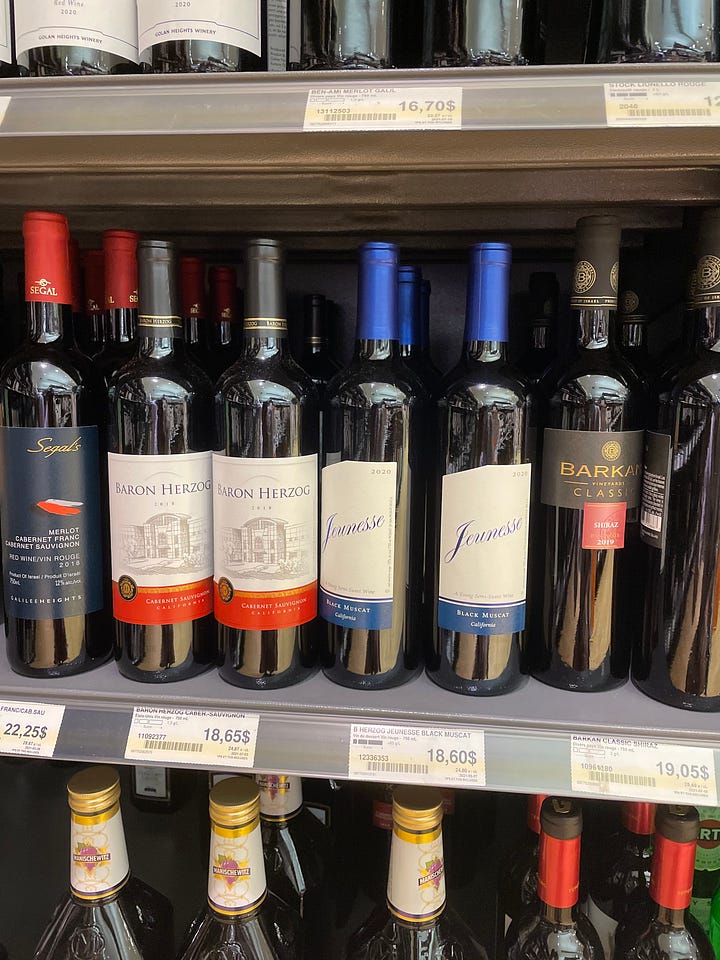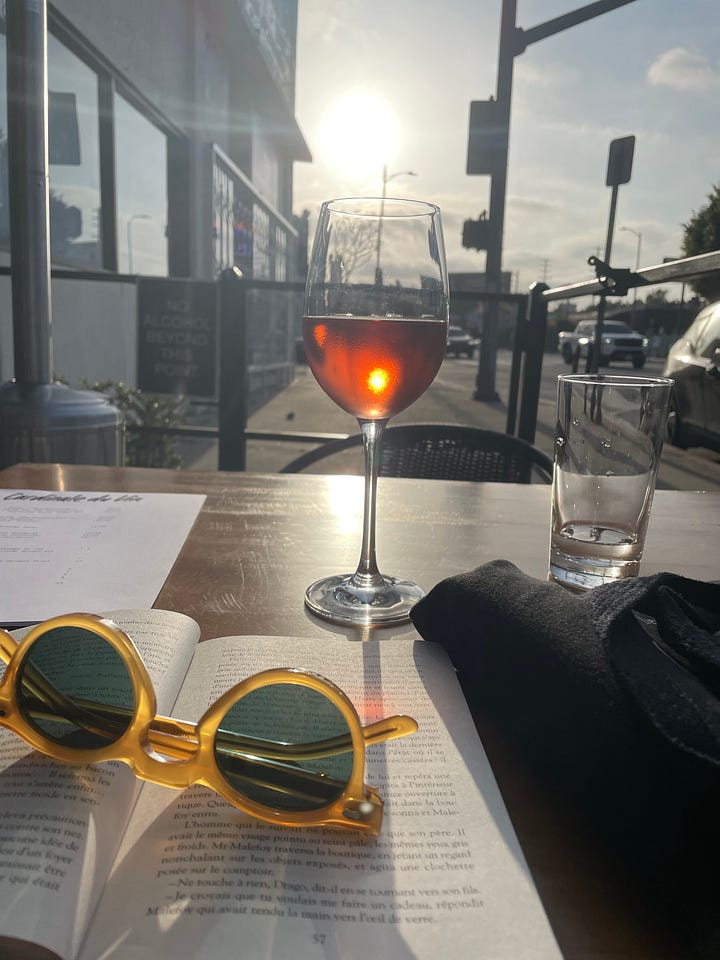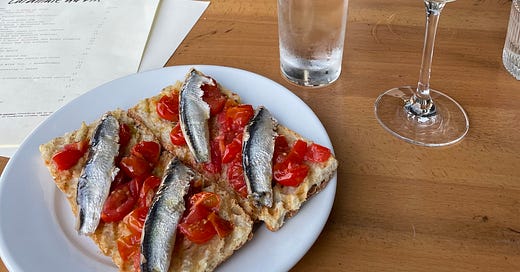There was nowhere normal in this neighbourhood to pop in for a glass of wine until Cardinale. It’s a tiny outfit located between my shul and a judaica shop. When they opened, everyone in Pico scoffed at their sandwich board that advertised “CHAMPAGNE! HOT DOGS! OYSTERS!”. Did they know where they were opening up?! The owner himself said to me, “There was nowhere in this neighbourhood to get natural wine and oysters,” and he was right. Now the terrasse is always full.
“Is there anyone who lives here that’s not Jewish?”
“There are tons of them. You just never used to see them outside.”
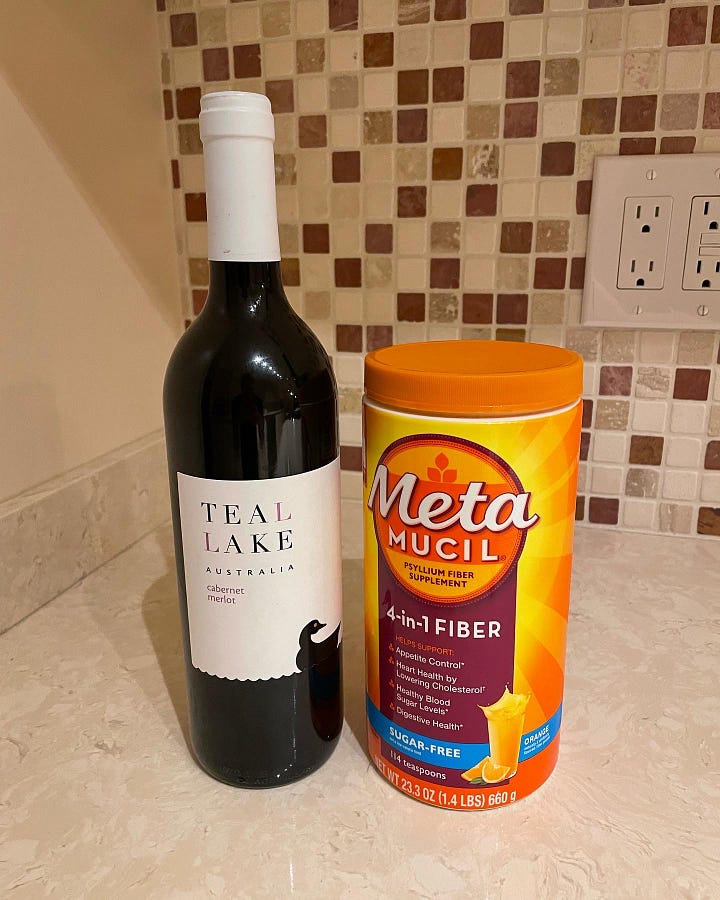
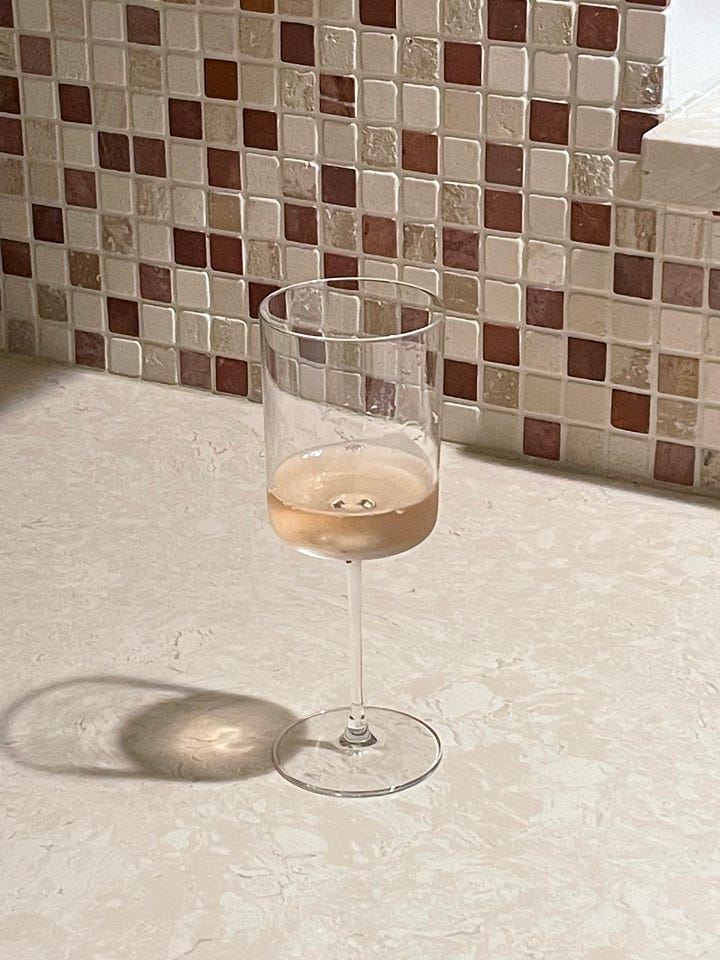
In the shtetl of Pico-Robertson, the closest approximation to a chic wine bar was Shilohs, then under new ownership, but a glass of Baron Herzog sauvignon blanc would run you the same as buying a whole bottle in the market across the street. And while the beef bacon flatbread was delicious and totally better than everything else on the menu, as a kosher restaurant it lacked the je ne sais quoi (careful, thoughtful branding plus attachment to algorithmically driven tastes for “authentic”, “unfussy” and “casual”) of normal places. Mais en effet je sais exactement c’est quoi: The overall sentiment of the kosher dining world is that this is the absolute best we can do given the circumstances. Please don’t ask too many questions.
Obviously there are exceptions, but none of them are within walking distance of my house. Drinks and appetizers at somewhere like Shilohs always runs the risk of running into your nightmare in-laws or the woman who bullied you out of the cookbook club.
I asked – begged – the owners at Cardinale to include kosher wine on the menu so that the rest of the people I knew could enjoy it there too. They acquiesced after a couple of months, but they didn’t know what mevushal was and had what I can only assume was a deeply unpleasant interaction with a customer after already opening and pouring a hundred dollar bottle of champagne. But to have the option in my neighbourhood? Being able to get an espresso, a can of expensive sardines, a glass of wine, sit on a patio and read a book?? In PICO?!??? Priceless!!!!!
In the midst of the chicness famine plaguing the kosher world, three restaurants have opened up in LA hoping to get to the root of the issue. Next Door, which opened “on the other side of town where all the Ashkentootsies live,” (according to my husband, Persian), hardly feels kosher at all if you don’t look around at the other diners. On some nights they have a DJ and people dance around mostly un-self consciously. They have adventurous seasonal menu items like duck breast braised with tart cherries or beef tartare served over crispy fried polenta. More importantly, they were the first kosher restaurant to embrace the “small plates you can all kind of share” ethos that ripped through the restaurant scene a decade ago. We go there when we want to eat an interesting seasonal vegetable, a nice piece of fish, and a steak that feels thoughtful – infused with intention, kavanah. The other local steakhouses suffer from Persistent Wedding Caterer Syndrome, lacking both imagination and effort.
Over yonder on the other other side of town in Tarzana, TLV Tapas takes the best of everything I just mentioned – small plates, kavanah, sex appeal – and gives it human growth hormone. Until TLV, most people I knew only ventured in that direction to visit the Herzog winery, which is actually just a restaurant in an office park and not a sprawling vineyard, and while delicious, a uniquely un-atmospheric dining experience.
Most of the menu offerings at TLV are more “vaguely mediterranean” than Next Door, and while the meat is excellent, the real breakout stars are their cocktails. A strong fruity drink with a whole slice of watermelon and the Turkish coffee martini stand out particularly, especially after I had a fight with my wedding caterer about whether or not the coffee liqueur we wanted to use in our signature cocktail – an espresso martini – was actually kosher. The mashgiach had the final word and said no, so we served skinny margaritas instead. But the whole thing left a taste in my mouth as bitter as instant coffee. And also the mashgiach didn’t know we were gay until the chuppah and he was mad about it. But homosexual Jews deserve kosher food too! Treif in the bedroom does not mean we should be treif in the kitchen!


As a casual lover of wine myself who has never put in an honest effort to only drink kosher wine, I was ruminating on the spiritual consequences of treif wine. I turned to my favourite halachic resource, Imamother.com, to better understand what the big deal was.
One woman posed the question, “Does non-kosher wine fall into the same category as a cheese burger?”
The first response said yes. Another woman advised, “You can’t pick and choose the halachos you want to follow.”
Many people have a negative impression of kosher wine because they’ve heard that for wine to be kosher, it needs to be boiled. This is a misconception, and there are good, cheap kosher wines that are widely available. But for every good bottle in Glatt Mart or Trader Joes, there are 45 terrible ones made with the same effort as most kosher restaurant menus – this is the best we can do, and we know somebody will pay for it because they don’t have a choice.
There are layers to the production, distribution and consumption of kosher wine that can be better explained by a rubric or an illustration. Idol worship wine is worse than goyishe wine which is worse than kosher non-mevushal wine touched by a non-Jew who poured it with the kavanah of an idolator, the name of an idol on his lips, which is worse than if the unsuspecting Swedish sommelier at Cardinale pouring the bottle of champagne for a frum guest who would be otherwise totally unconcerned with maris ayin by sitting in a mostly non-kosher restaurant in the middle of Pico-Robertson. But all of the above are unfit for consumption by a Jew at the peril of his soul. Or for other reasons.
To create kosher wine is such an endeavour that few wine producers would ever be willing to make the switch – not least because the flash pasteurization required to make the wine mevushal and therefore more marketable to large buyers threatens to change the integrity of the wine – but because it requires a shabbos observant male to supervise the entire lifecycle of production. A decade ago in the Okanagan valley, Canada’s wine country, a Chabad rabbi supervised one lot of wine for pesach and they priced it at $128 a bottle. They never did it again.
The spiritual consequences of consuming treif wine are fuzzier than the social ramifications. The sages say that wine brings people together, therefore treif wine should be avoided in case of intermarriage. Even if intermarriage can be totally avoided, one may run the risk of alienating their Jewish friends and family, who may not feel comfortable eating food from their kitchens or clinking glasses at their simchas. Like Tablet K cheese, treif wine represents a slippery slope to the total dissolution of the Jewish community in the face of an increasingly harsh world.
Sensing the Jewish world is on the brink of peril, the Israeli restaurant Basbussa recently went Glatt Kosher. Patrons can order incredible meat dishes like areyes lollipops and chimichurri lamb chops while sipping on $17 glasses of Vera Wang prosecco – all while being served by the horniest, sexiest waiters the kosher LA dining scene has ever seen. Not to mention the hookah or the DJ. Going kosher also means closing ranks – higher prices and an aversion to overt Israeli and Jewish branding will push some diners away. There may be mixed dancing and shisha, but at least everyone participating is Jewish.
